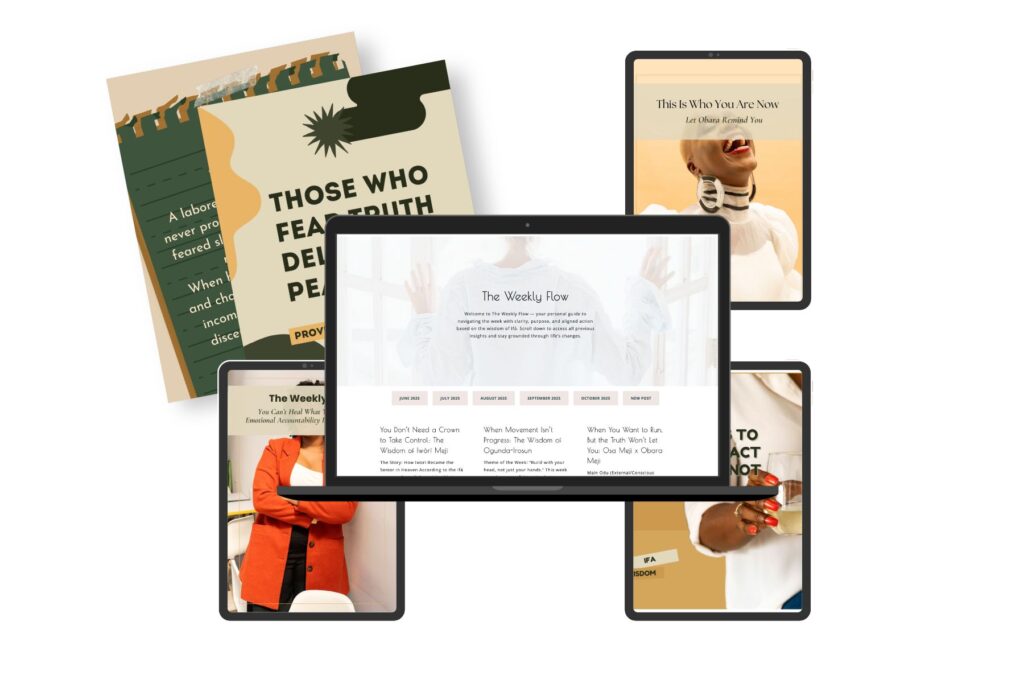IDENTIFYING “ESU TRAPS” – RECOGNIZING LIFE’S PITFALLS (E.G., GREED, HASTE, DISHONESTY)

The Wisdom of Eshu and Life’s Hidden Traps
In Yoruba mythology, Eshu (also known as Elegua) is a revered deity of crossroads, change, and unpredictability. Often misunderstood as a mere trickster, Eshu serves as a teacher who tests human judgment through challenges.
These tests, called ‘Eshu traps’, manifest as pitfalls like greed, haste, and dishonesty—behaviors that seem rewarding in the moment but lead to long-term consequences.
By recognizing these traps, we can align our actions with wisdom and integrity.
So how can we recognize and avoid them?
In this guide, we’ll explore the common “Esu Traps” that hinder success and practical strategies to sidestep them.
Heads Up! Before we dive in, check out the Mini Weekly Flow to get started.
I’ve bundled a weekly resource for the most important areas of your life: love/relationships, career/finances, mindset/self-awareness and more to make reaching your goals simple. To take control of your life and make things simple, you can start planning your week ahead when you signup for your free weekly mini-flow newsletter.

5 Common “Esu Traps” and How to Avoid Them
1. The Trap of Greed – Wanting More at Any Cost
Greed is a common pitfall, an insatiable hunger for more—wealth, power, or validation luring us into thinking that more is always better. It’s one of Eshu’s most seductive traps.
Whether it’s chasing money, status, or power, greed blinds us to ethical boundaries and long-term consequences.
How to Spot the Greed Trap:
- Obsession with accumulation
- Prioritizing material gain over personal well-being.
- Neglecting empathy
- Ignoring the impact of your actions on others.
- Short-term gratification
- Sacrificing long-term stability for immediate rewards.
How to Avoid It:
- Shift your focus from accumulation to appreciation.
- Practice contentment and gratitude daily.
- Make decisions based on sustainability, not just short-term gains.
Remember Eshu’s lesson: true abundance lies in balance.
2. The Trap of Haste – Rushing Without Thinking – Speed Without Direction
In a world of instant gratification, haste masquerades as productivity.
It’s easy to fall into the trap of haste—making quick decisions without weighing the consequences.
Eshu tempts us with quick fixes, but rushed decisions often lead to mistakes or missed opportunities.
Signs You’re Caught in the Haste Trap:
- Impulsive choices – Acting without weighing consequences.
- Burnout – Overcommitting to tasks without reflection.
- Superficial results – Valuing quantity over quality.
How to Avoid It:
- Develop the habit of pausing before major decisions.
- Use deep breathing techniques to slow down impulsive reactions.
- Trust the process—good things take time to build.
Create space for reflection, prioritize tasks, and break goals into manageable steps.
As Eshu teaches, every crossroads demands careful consideration.
3. The Trap of Dishonesty – Twisting the Truth for Short-Term Gain
Dishonesty might bring temporary success, but it always carries a hidden cost—whether in relationships, business, or personal integrity.
Dishonesty—whether lying to others or ourselves—offers temporary comfort but erodes trust and self-respect. Eshu exploits this trap to reveal the fragility of deceit.
Recognizing the Dishonesty Trap:
- Justifying small lies: Believing “harmless” falsehoods have no impact.
- Self-deception: Ignoring flaws or avoiding accountability.
- Broken relationships: Eroding connections through mistrust.
How to Avoid It:
- Align actions with honesty, even when it’s inconvenient.
- Surround yourself with people who value truth and accountability.
- Remember: every lie creates more complications down the line.
Eshu reminds us that authenticity builds enduring success.

4. The Trap of Misplaced Trust – Giving the Wrong People Access
Not everyone deserves a front-row seat in your life.
Misplaced trust can lead to betrayal, disappointment, or unnecessary struggles.
How to Avoid It:
- Watch actions, not just words—true character is revealed over time.
- Establish boundaries and honor your intuition.
- Build relationships slowly and intentionally.
5. The Trap of Ignoring Signs – Refusing to See the Red Flags
Esu often places signs in our path, warning us before we make poor choices.
But how often do we ignore the red flags?
How to Avoid It:
- Listen to your gut—it often knows before your mind does.
- Journal about repeated patterns in your life.
- Seek guidance from wise mentors when uncertain.
How to Identify Eshu Traps in Daily Life
- Pause at crossroads: When facing decisions, ask, “Am I acting from fear or integrity?
- Reflect on patterns: Recurring setbacks may signal an overlooked trap.
- Seek feedback: Trusted mentors can offer objective perspectives.
Turning Traps into Stepping Stones
Esu’s lessons aren’t meant to harm us—they are meant to awaken us – invitations to grow.
Recognizing these traps allows us to move with wisdom, intention, and alignment.
By slowing down, practicing honesty, and learning from our mistakes, we turn life’s crossroads into stepping stones toward a fulfilled destiny.
Which of these “Esu Traps” have you encountered? Share your experience in the comments!
Ready to make better decisions and avoid these pitfalls?
Recenter your thoughts and strengthen your focus — explore more Ifá-inspired insights in the Mindset & Clarity (Èrò) Library
Ready to be fully supported in achieving your goals?
I’m giving you the blueprint, each week, to think better, move smarter, and live with more clarity, structure, and consistency. Ready to level up?

